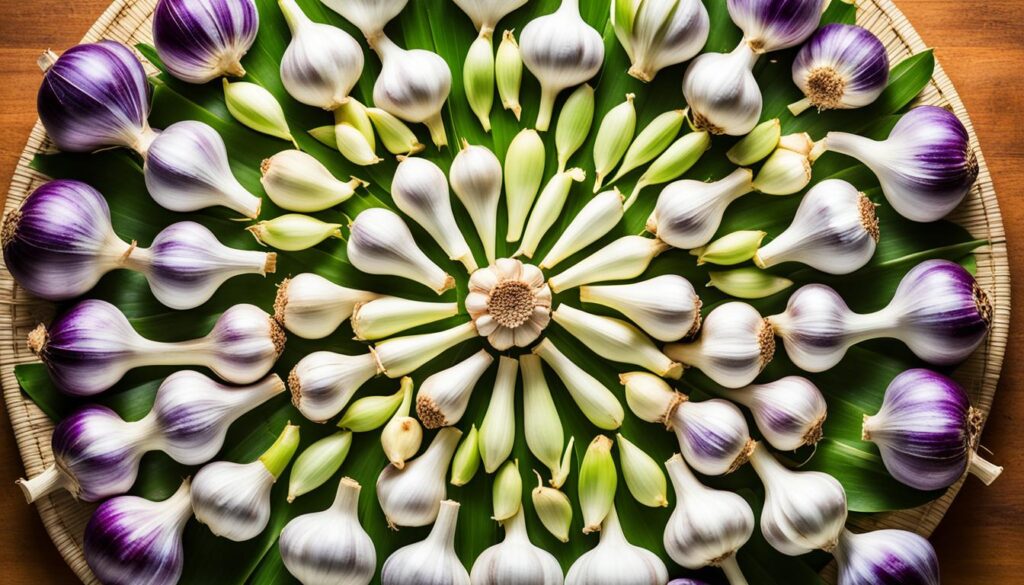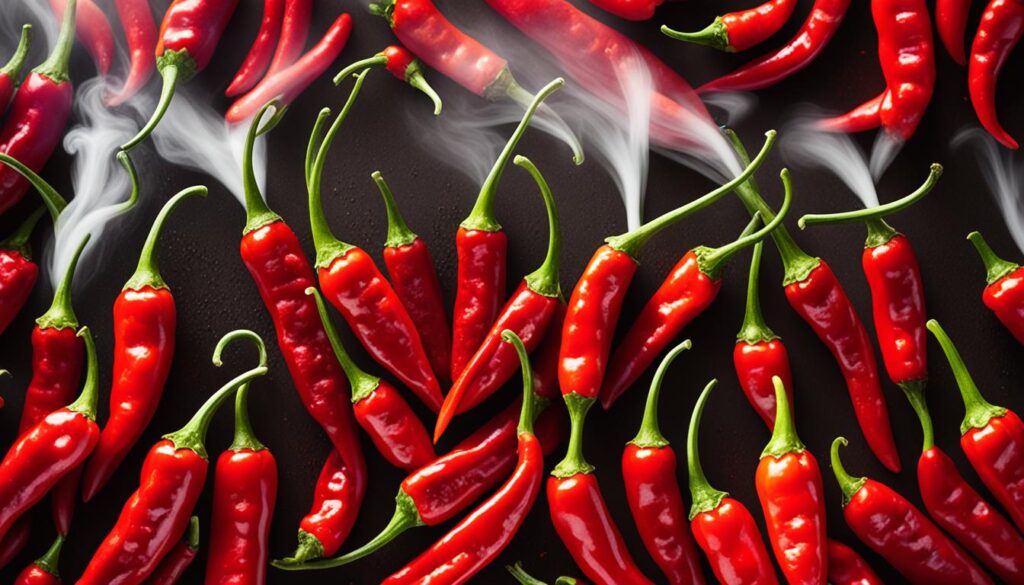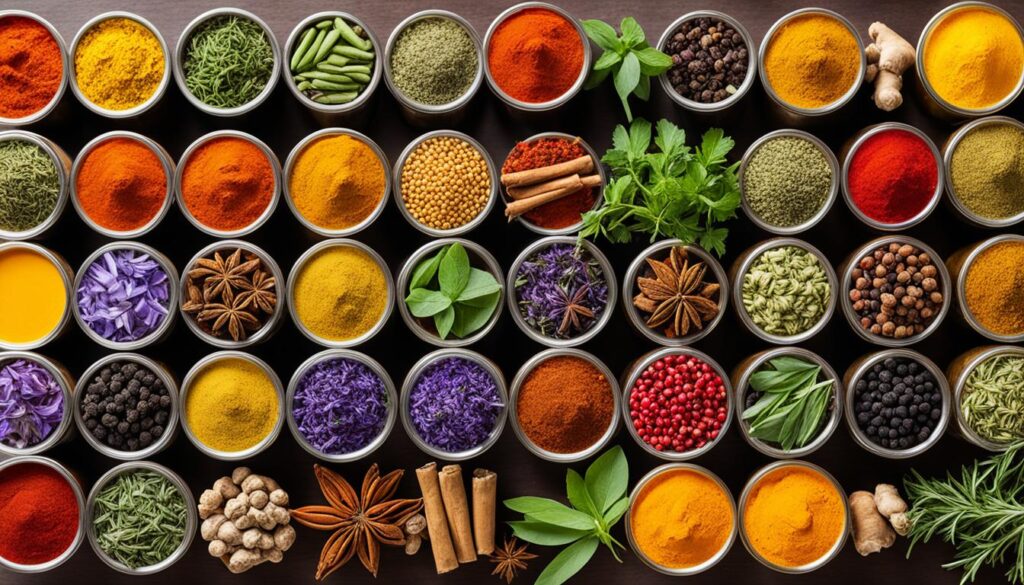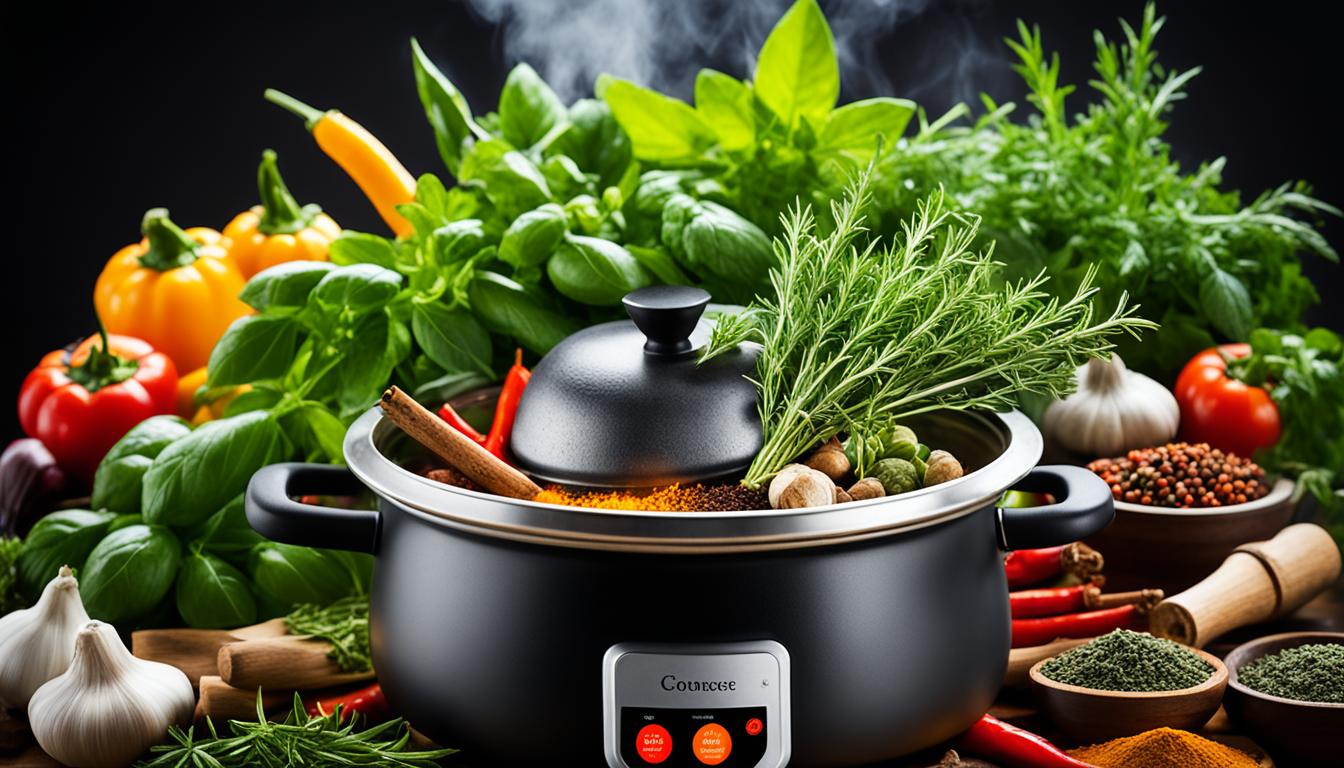When it comes to cooking, flavor and nutrition go hand in hand. That’s where herbs and spices come into play. Not only do they add a delightful burst of taste to your dishes, but they also offer a wide range of health benefits. Cooking with herbs and spices can elevate your health by reducing the need for excess salt and enhancing the nutritional value of your meals.
Herbs and spices are culinary powerhouses that have been used for centuries in various cuisines around the world. They not only add complexity and depth to your recipes but also bring potential health benefits to the table. Powerhouse ingredients like ginger, garlic, and turmeric boast anti-inflammatory properties, while others offer antioxidant, antiviral, and antimicrobial effects. Incorporating herbs and spices is not only a fantastic way to spice up your meals but also a clever way to encourage your kids to eat more vegetables.
Key Takeaways:
- Cooking with herbs and spices enhances flavor and nutrition in your meals.
- Herbs and spices have been used in culinary traditions for centuries, adding nuance to dishes.
- They offer potential health benefits with antioxidant, anti-inflammatory, and antimicrobial effects.
- Incorporating herbs and spices can reduce the reliance on high-sodium processed foods.
- Using herbs and spices is a creative way to get your kids to eat more veggies.
The History and Importance of Cooking with Herbs and Spices
Cooking with spices and herbs is not a new concept. These flavorful ingredients have been an integral part of culinary traditions around the globe for centuries. From ancient civilizations to modern kitchens, the use of herbs and spices has been cherished for their ability to elevate flavors, add nuance, and create dynamic tastes in dishes.
But their significance goes beyond just enhancing the taste of food. Herbs and spices offer a wide range of potential health benefits, making them indispensable in the kitchen. Incorporating herbs and spices into your cooking can help reduce the reliance on high-sodium processed foods, adding more nutritional value to your meals.
“Herbs and spices are not just seasonings; they are nature’s powerful allies in promoting health and well-being.”
In fact, the history of cooking with herbs and spices dates back thousands of years. Ancient civilizations such as the Egyptians, Greeks, and Romans recognized the medicinal properties of various herbs and spices and used them for their healing abilities. These culinary traditions have been passed down through generations, leading to the diverse repertoire of flavors and techniques we have today.
Herbs and spices are packed with antioxidants, minerals, and vitamins that contribute to overall health. They have been studied for their potential anti-inflammatory, antimicrobial, and even anticancer effects. By incorporating these powerhouse ingredients into your meals, you not only enhance the taste but also boost the nutritional profile of your dishes.
Culinary Traditions of Spices and Herbs
| Cuisine | Key Spices and Herbs |
|---|---|
| Indian | Turmeric, cumin, coriander, cardamom, fenugreek |
| Thai | Galangal, lemongrass, kaffir lime leaves, Thai basil |
| Mexican | Chili peppers, oregano, cumin, cilantro |
| Moroccan | Cumin, coriander, cinnamon, ginger |
| Mediterranean | Garlic, oregano, rosemary, thyme, basil |
As you explore the culinary traditions of different cultures, you’ll discover an array of spices and herbs that contribute their unique flavors and health benefits. From Indian curries to Thai stir-fries, Mexican salsas to Moroccan tagines, and Mediterranean marinades to herbal infusions, the world of herbs and spices is a fascinating journey of taste and wellness.
Next, we’ll delve deeper into the specific health benefits of cooking with herbs and spices, uncovering the secrets of their antioxidant effects, anti-inflammatory properties, and more.
Health Benefits of Cooking with Herbs and Spices
When it comes to cooking, herbs and spices are not just for adding flavor—they also offer a plethora of health benefits. Incorporating these natural ingredients into your meals can elevate both the taste and nutritional value of your dishes. Let’s explore some of the remarkable health benefits that herbs and spices have to offer.
Antioxidant Effects of Spices
One of the key health benefits of herbs and spices is their high antioxidant content. Antioxidants help combat oxidative stress and reduce the risk of chronic diseases. Consuming a variety of spices, such as turmeric, cinnamon, and cloves, can provide a powerful dose of antioxidants that support overall health.
Anti-Inflammatory Properties of Herbs
Many herbs possess potent anti-inflammatory properties. Incorporating herbs like ginger, rosemary, and basil into your cooking can help alleviate inflammation-related conditions. These natural ingredients can be valuable additions to your meals, promoting a healthy and balanced lifestyle.
Nutritional Potential of Fresh vs Dried Herbs
While both fresh and dried herbs can enhance the flavor of your dishes, fresh herbs generally have a higher nutritional potential. They are rich in vitamins, minerals, and essential oils that may be more concentrated compared to their dried counterparts. However, dried herbs still offer health benefits and can be a convenient option when fresh herbs are not readily available.
Herb and Spice Substitutes for Salt
Excessive salt consumption is linked to various health issues, including high blood pressure and heart disease. Herbs and spices can be excellent substitutes for salt, allowing you to reduce your sodium intake without compromising flavor. For instance, using herbs like oregano, thyme, and rosemary, or spices such as cumin and paprika can enhance the taste of your meals while promoting heart health.
Herbs and Spices for Heart Health
Your heart will thank you for incorporating herbs and spices into your cooking. Certain herbs and spices, like garlic and cayenne pepper, have been shown to support heart health. Garlic can help regulate blood pressure and cholesterol levels, while cayenne pepper can improve blood circulation and metabolism. By spicing up your dishes with these heart-healthy ingredients, you can take an active step towards maintaining cardiovascular well-being.
The Nutritional Potential of Cooking with Herbs and Spices
| Herb/Spice | Nutrient Profile | Health Benefits |
|---|---|---|
| Basil | Vitamin K, iron, calcium, magnesium | Antioxidant, anti-inflammatory, supports digestion |
| Oregano | Antioxidants, vitamin K, iron, calcium | Antibacterial, supports immune system, may aid digestion |
| Turmeric | Curcumin, iron, manganese, potassium | Anti-inflammatory, antioxidant, supports brain health |
| Cayenne Pepper | Vitamin A, capsicum | Boosts metabolism, aids digestion, may reduce pain |
As you can see, cooking with herbs and spices can bring an array of nutritional benefits to your plate. From the anti-inflammatory properties of basil and oregano to the brain-boosting abilities of turmeric, these natural ingredients offer a range of health-supporting properties.
So why not invite these flavor-packed additions into your kitchen? Start experimenting with herbs and spices, and enjoy the delicious taste and incredible health benefits they offer.

Popular Herbs and Spices for Flavor and Health
When it comes to adding flavor and health benefits to your meals, there are numerous popular herbs and spices that can elevate your culinary creations. Let’s explore some of these flavorful and nutritious ingredients:
Black Pepper
Black pepper is a versatile spice that is commonly used in various cuisines. Not only does it add a burst of flavor, but it also offers antioxidant properties that can help protect your body against harmful free radicals.
Turmeric
Turmeric, renowned for its vibrant yellow color, contains an active compound called curcumin. Curcumin has been extensively studied for its potential anti-inflammatory effects, making turmeric a valuable addition to your spice rack.
Cayenne Pepper
Incorporating cayenne pepper into your meals can do more than just provide a spicy kick. This fiery spice has been associated with boosting metabolism and aiding in weight management, thanks to a compound called capsaicin.
Garlic

Garlic not only adds depth of flavor but also offers heart-healthy properties. It contains sulfur compounds that may help maintain healthy blood pressure levels and promote cardiovascular well-being.
Cinnamon
Cinnamon is a beloved spice known for its warm and comforting flavor. Beyond its taste, cinnamon has been shown to help regulate blood sugar levels, making it a fantastic choice for those looking to manage their blood sugar levels naturally.
Ginger
Ginger is not only a staple in many cuisines but also boasts impressive health benefits. Its potent anti-inflammatory properties may help reduce inflammation and alleviate certain inflammatory conditions.
Basil and Parsley
Incorporating fresh basil and parsley into your cooking can provide a burst of freshness and flavor. Both herbs offer their unique health benefits, with basil being rich in antioxidants and parsley boasting excellent digestive properties.
Fresh Mint
Adding fresh mint to your dishes can not only enhance the flavor but also aid in digestion. Mint has been traditionally used to soothe stomach discomfort and promote healthy digestion.
Rosemary
Rosemary not only infuses dishes with its aromatic scent but also offers potential benefits for your blood vessels. It contains compounds that may support healthy blood flow and promote overall cardiovascular health.
Cayenne Pepper (Again)

Cayenne pepper deserves a second mention due to its numerous health benefits. In addition to aiding metabolism, it is believed to act as a natural pain reliever and may also offer additional vitamin A benefits.
| Herb or Spice | Key Benefits |
|---|---|
| Black Pepper | Antioxidant properties |
| Turmeric | Anti-inflammatory effects |
| Cayenne Pepper | Metabolism boosting |
| Garlic | Heart-healthy properties |
| Cinnamon | Helps regulate blood sugar levels |
| Ginger | Anti-inflammatory benefits |
| Basil | Rich in antioxidants |
| Parsley | Excellent for digestion |
| Fresh Mint | Flavorful and aids digestion |
| Rosemary | Supports healthy blood vessels |
| Cayenne Pepper (Again) | Metabolism boosting and potential pain relief |
These popular herbs and spices not only add depth and complexity to your dishes but also provide potential health benefits. Experimenting with different combinations can bring out exciting flavors and enhance your overall culinary experience. So, why not explore the world of herbs and spices and unlock the full potential of your cooking?
Incorporating Herbs and Spices in Your Cooking
When it comes to cooking with herbs and spices, the possibilities are endless. These flavorful additions can take your dishes to a whole new level and enhance the overall dining experience. Whether you’re a seasoned chef or an amateur cook, there are various creative ways to incorporate herbs and spices into your culinary creations.
Cooking Tips with Herbs and Spices
One of the easiest ways to infuse your dishes with the essence of herbs and spices is to add them while cooking. As the flavors meld together, they infuse every bite with their aromatic goodness. For example, adding rosemary and thyme to roasted chicken can create a savory and aromatic dish that will leave your taste buds craving more.
Seasoning with Herbs and Spices
Seasoning your meals with a variety of herbs and spices can add depth and complexity to the flavors. From classics like oregano and basil in Italian cuisine to the distinctive blend of cumin and coriander in Indian dishes, each herb and spice brings its own unique character to the table. Don’t be afraid to experiment and find your own signature spice blend.
Using Herbs and Spices in Drinks
Herbs and spices are not just limited to savory dishes; they can also be used to elevate your drinks. Infusing herbs like mint or basil in teas or cocktails can add a refreshing twist and a burst of flavor. Try a mojito with fresh mint leaves or a chamomile tea infused with lavender for a soothing and aromatic beverage.
Making Spice-Infused Oils
Spice-infused oils are a fantastic way to add flavor to your cooking. Simply combine your favorite herbs and spices with oil, let them steep, and then strain out the solids. The resulting flavored oil can be drizzled over salads, used as a marinade, or even as a dipping sauce for bread. The possibilities are endless, and you can customize the flavor profile to suit your taste.
By incorporating herbs and spices into your cooking, you not only enhance the taste of your dishes but also reap the many benefits they offer. From tantalizing your taste buds to adding a nutritional boost, these culinary gems can transform an ordinary meal into a culinary masterpiece.
Using Herbs and Spices for Health Conditions
Certain herbs and spices have been shown to provide relief and support for specific health conditions. Incorporating these natural remedies into your diet can be a great way to enhance your overall well-being. However, it’s crucial to consult with a healthcare professional before making any significant changes to your diet, especially if you have existing medical conditions or are currently taking medications.
Herbs and Spices for Inflammation
Inflammation is a natural response by the body to protect itself, but chronic inflammation can lead to various health issues. Turmeric and ginger are two powerful herbs known for their anti-inflammatory properties. Turmeric contains curcumin, a compound that has been extensively studied for its potential to reduce inflammation. Ginger, on the other hand, contains gingerol, which also possesses anti-inflammatory effects.
Herbs and Spices for Digestive Issues
If you’re dealing with digestive issues like bloating or indigestion, certain herbs and spices may provide relief. Ginger, in particular, has long been used to aid digestion. It can help soothe the digestive tract, reduce nausea, and alleviate gastrointestinal discomfort.
Herbs and Spices for Heartburn and GERD
Heartburn and gastroesophageal reflux disease (GERD) can be bothersome and may disrupt your daily life. While certain herbs and spices can trigger heartburn symptoms in some individuals, others may actually help alleviate discomfort. Keeping a food diary can help identify your triggers and determine which herbs and spices aggravate your symptoms. For example, spicy foods like cayenne pepper or acidic options like citrus fruits may worsen heartburn for some people.
Using Herbs and Spices for Diabetes Management
For individuals managing diabetes, incorporating certain herbs and spices into their diet may help regulate blood sugar levels. Garlic has demonstrated potential in improving insulin sensitivity and reducing blood sugar levels. Additionally, cinnamon has been studied for its ability to enhance insulin action, making it a popular choice for individuals with diabetes.
Remember, it’s important to consult with a healthcare professional and consider your individual health needs before using herbs and spices for specific health conditions. While these natural remedies can offer potential benefits, they are not intended to replace medical advice or treatment. By working closely with your healthcare team, you can develop a well-rounded approach to managing your health.

| Health Condition | Recommended Herbs and Spices |
|---|---|
| Inflammation | Turmeric, Ginger |
| Digestive Issues | Ginger |
| Heartburn and GERD | Identify triggering herbs and spices through a food diary |
| Diabetes Management | Garlic, Cinnamon |
The Benefits of Using Fresh Herbs and Spices
Fresh herbs and spices bring a whole new level of flavor and nutrition to your cooking. While dried herbs can serve as a suitable alternative when fresh ones aren’t available, there are distinct advantages to using fresh herbs and spices in your culinary creations.
One of the primary benefits of fresh herbs is their heightened nutritional potential. Fresh herbs are packed with essential vitamins, minerals, and antioxidants, providing a healthier option compared to their dried counterparts. They retain their vibrant colors and delicate flavors, adding a burst of freshness to your dishes.
When it comes to spices, using them in their fresh form offers a more vibrant flavor and aroma. Freshly ground or grated spices release their essential oils, intensifying the taste profile of your meals. Whether it’s the zing of fresh ginger or the earthy warmth of freshly ground black pepper, fresh spices lend a delightful complexity to your recipes.
Moreover, the use of fresh herbs and spices allows you to explore and experiment with unique flavor combinations. With each season bringing its own variety of fresh herbs and spices, you can tailor your dishes to reflect the time of year and infuse them with a distinct character.
Maximizing Flavor and Health with Fresh Herbs and Spices
When it comes to maximizing both flavor and health benefits, fresh herbs and spices are the way to go. The vibrant colors and robust flavors of fresh herbs add depth to your dishes, enhancing the overall taste experience. Additionally, incorporating fresh spices can contribute to a more balanced, nutritious diet, as they offer potential health benefits such as anti-inflammatory and antioxidant properties.
I love the aroma and taste of fresh basil in my homemade marinara sauce. It takes the flavor to a whole new level. And knowing that it’s also providing antioxidant benefits makes it even better!
Benefits of Cooking with Fresh Herbs
Using fresh herbs can revolutionize your cooking in several ways:
- Enhanced flavor: Fresh herbs infuse your dishes with a vibrant, nuanced taste that cannot be replicated by dried herbs.
- Health benefits: Fresh herbs contain higher levels of antioxidants, vitamins, and minerals, contributing to your overall well-being.
- Visual appeal: The bright colors and delicate textures of fresh herbs can elevate the visual presentation of your meals.
- Culinary versatility: Different herbs complement various cuisines, allowing you to explore a range of flavors and experiment with international recipes.
To showcase the benefits of fresh herbs and spices, let’s take a look at a comparison between fresh and dried basil:
| Aspect | Fresh Basil | Dried Basil |
|---|---|---|
| Flavor | Fresh, pungent, and slightly sweet | Milder, slightly herbal |
| Aroma | A strong, aromatic scent | Mild fragrance |
| Color | Vibrant green | Olive green/brown |
| Nutritional Value | Rich in vitamins A, C, and K, as well as minerals like iron and calcium | Less nutrient-dense due to the dehydration process |
As you can see, fresh basil not only offers a more robust flavor and aroma but also contains a higher concentration of essential nutrients.
So, whether you’re garnishing a salad with freshly picked dill or incorporating a handful of freshly chopped cilantro into your salsa, the benefits of using fresh herbs and spices are undeniable. They enhance the taste, promote good health, and elevate your culinary creations to new heights.
With fresh ingredients like herbs and spices, cooking becomes an art form, allowing you to express your creativity and nourish your body at the same time. So, why settle for anything less than the vibrant flavors and nutritional benefits that fresh herbs and spices bring to the table?
Tips for Cooking with Herbs and Spices
Experimenting with herbs and spices can take your cooking to a whole new level of flavor and excitement. By trying new combinations, you can unlock unique taste profiles that will wow your taste buds and impress your family and friends.
If you’re looking for ways to enhance vegetable consumption, herbs and spices can be your secret weapon. Even picky eaters can be enticed by the enticing aromas and delicious flavors that herbs and spices bring to vegetables. So, if you want to make veggies more appealing, try adding a sprinkle of herbs and spices to elevate their taste.
Start by using small amounts of herbs and spices, especially if you’re trying them for the first time. Gradually increase the quantity as you become more familiar with their flavors and how they complement different dishes. This will allow you to find the perfect balance that suits your individual taste preferences.
“Herbs and spices are like a playground for your palate. Don’t be afraid to experiment and have fun with them – you never know what culinary delights you might discover.”
Here are some tips to help you make the most of your herbs and spices:
- Explore new combinations: Mix and match different herbs and spices to create unique flavor profiles that suit your taste. Don’t be afraid to think outside the box and be adventurous in your culinary experiments.
- Know your strengths: Different herbs and spices have different strengths and flavor intensities. Be mindful of this when using them in your dishes to ensure a well-balanced outcome.
- Use herbs as a finishing touch: Add fresh herbs at the end of the cooking process to preserve their vibrant flavors. They can add a pop of color and freshness to your dishes.
- Experiment with spice blends: Try using pre-made spice blends or create your own to add complexity and depth to your dishes. These blends are often a mix of complementary flavors designed to elevate your cooking.
- Don’t forget about dried herbs and spices: While fresh is great, don’t underestimate the flavor potency of dried herbs and spices. They can still add a lot of flavor to your dishes, especially when fresh options are not available.
Remember, cooking with herbs and spices is all about creativity and personal taste. Don’t be afraid to get creative in the kitchen and discover your own unique flavor combinations. Enjoy the journey of exploring the endless possibilities that herbs and spices have to offer!
| Herb/Spice | Vegetable Pairing | Flavor Profile |
|---|---|---|
| Basil | Tomatoes, zucchini, eggplant | Herbaceous, slightly sweet |
| Rosemary | Root vegetables, potatoes | Woody, pine-like |
| Cumin | Carrots, sweet potatoes | Warm, earthy |
| Thyme | Mushrooms, roasted vegetables | Earthy, slightly floral |
| Turmeric | Cauliflower, carrots | Earthy, slightly peppery |
Conclusion
Cooking with herbs and spices is a culinary adventure that not only elevates the flavor of your meals but also provides a wide range of health benefits. By incorporating an array of herbs and spices into your cooking, you can enhance both the taste and nutritional value of your dishes. From the zesty kick of black pepper to the vibrant gold of turmeric, the sweet warmth of cinnamon to the fiery essence of ginger, there is a universe of flavors waiting for you to explore.
Whether you are a seasoned chef or just starting your culinary journey, experimenting with herbs and spices can lead to delicious and healthier meals. The antioxidant properties of herbs and spices can help combat oxidative stress and reduce the risk of chronic diseases. Many spices also boast anti-inflammatory effects, which may alleviate inflammation-related conditions. By substituting herbs and spices for salt, you can lower your blood pressure and decrease the risk of heart disease.
So, don’t be afraid to spice up your cooking! Let your creativity soar as you infuse your dishes with the fragrant aromas and vibrant colors of fresh herbs and spices. Unleash your inner chef and savor the benefits of flavorful and healthy cooking. Discover the magic that herbs and spices can bring to your meals, and watch as your taste buds dance with delight.
FAQ
How can cooking with herbs and spices enhance the flavor of my meals?
Herbs and spices add depth, nuance, and dynamic tastes to dishes, elevating the flavor and creating unique taste profiles.
Are there specific health benefits to cooking with herbs and spices?
Yes, herbs and spices offer potential health benefits such as antioxidant, anti-inflammatory, and antimicrobial effects.
How can herbs and spices contribute to a healthier diet?
By using herbs and spices, you can reduce the reliance on high-sodium processed foods and add more nutritional value to your meals.
What are some popular herbs and spices that can enhance both flavor and health benefits?
Examples include black pepper, turmeric, cayenne pepper, garlic, cinnamon, ginger, basil, parsley, mint, and rosemary.
How can I incorporate herbs and spices into my cooking?
You can infuse spices in foods while cooking, season dishes with a variety of herbs and spices, use them in drinks, or make spice-infused oils.
Can certain herbs and spices be beneficial for specific health conditions?
Yes, for example, turmeric and ginger have anti-inflammatory properties and may help alleviate inflammation-related conditions.
Are fresh herbs and spices better than dried ones?
Fresh herbs generally provide more nutritional potential and flavor, but both can be used in cooking.
How can I experiment with herbs and spices and encourage vegetable consumption?
Start with small amounts, gradually increase to find the right balance, and use herbs and spices to make vegetables more enticing and flavorful.
What are the overall benefits of cooking with herbs and spices?
Cooking with herbs and spices not only enhances the flavor of your meals but also provides various health benefits, making your dishes delicious and healthier.

